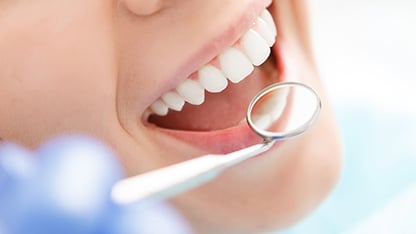Tooth dentinal tubule blockage studies supporting oral care product development and marketing claims against tooth sensitivity
Tooth dentinal tubule blockage laboratory studies support the development of oral care products that have been formulated to protect against dentine hypersensitivity.
Tooth sensitivity is a common dental condition experienced by many consumers of all ages and innovation in new and effective oral care or dental products, such as toothpaste, which target dental sensitivity is a growing market with an opportunity for strong brand differentiation through a clear demonstration of efficacy.
Dentine lies beneath the tooth enamel and is characterized by a network of microscopic tubules which extend through to the tooth pulp chamber and its supply of nerves. External stimuli (heat, cold, pressure) on exposed dentine can trigger the nerves causing dentinal hypersensitivity. Dentine hypersensitivity can be alleviated by physically blocking the tubules using specially-formulated toothpaste or mouthwash. The relative efficacy of different products often requires rapid evaluation to guide the development of new and existing formulations cost-effectively. The degree of blockage can be assessed in vitro by brushing specimens of human dentine with paste slurry and then subjectively grading Scanning Electron Microscope (SEM) images of the surface.
In Vitro Tooth Dentinal Tubule Blockage Study Services
Our oral care product laboratory team is experienced in carrying out in vitro dentinal tubule blockage studies to support the development of your oral care products or medical devices to address hypersensitivity.
Within our dedicated oral care lab we can produce dentine discs and blocks (bovine or human) in a variety of shapes and sizes using our range of abraders, wafering saws, lapping and polishing machines. The dentine is acid-etched to remove the smear layer and open up the tubules. Several samples are then assigned to each treatment group and can be brushed manually using an electric toothbrush together with your specified toothpaste(s). After each successive day of brushing samples can be examined under a scanning electron microscope (SEM) and images can be recorded for subjective analysis.
Images are graded by trained and calibrated assessors on a scale of 1 to 5 for the degree of occlusion. Means are calculated for each group of samples and results are statistically compared and presented in a comprehensive report that includes graphs, tables, data and images.
Intertek Clinical Research Services (CRS) has a dedicated in vitro laboratory which conducts testing of all aspects of Oral Care products. We are particularly adept in designing bespoke in vitro models to cater for your specific requirements. Intertek Clinical Research Services is licensed to handle and store human tissue under the Human Tissue Act 2004 and follows the principles outlined within the act as well as complying with local ethical guidelines.
For over 20 years our Clinical Research Services group has been a trusted partner for developers and manufacturers offering Total Quality Assurance expertise in vitro oral care product laboratory testing. We provide a one-source solution for in vitro studies providing robust data to support the efficacy of novel treatments.

In Vitro Dentine Tubule Occlusion Studies Video
